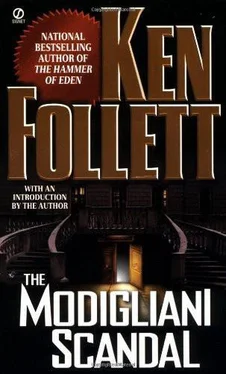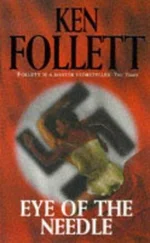″It was sad that he had such a conscience about it. I believe he was brought up quite strictly. Also, his health was a little delicate, so he worried about the drugs. He worried, but he still used them.″ The old man smiled and nodded, as if agreeing with his memories.
″He lived at the Impasse Falguière. He was so poor; he grew haggard. I remember when he went to the Egyptian section in the Louvre—he came back saying it was the only section worth seeing!″ He laughed happily. ″A melancholy man, though,″ he went on, his voice sobering. ″He always had Les Chants de Maldoror in his pocket: he could recite many French verses. The Cubism arrived at the end of his life. It was alien to him. Perhaps it killed him.″
Dee spoke softly, to guide the old man′s memory without dislocating his train of thought. ″Did Dedo ever paint while he was high?″
The man laughed lightly. ″Oh yes,″ he said. ″While he was high he would paint very fast, shouting all the time that this would be his masterpiece, his chef-d′oeuvre, that now all Paris would see what painting was all about. He would choose the brightest colors and throw them at the canvas. His friends would tell him the work was useless, terrible, and he would tell them to piss off, they were too ignorant to know that this was the painting of the twentieth century. Then, when he came down, he would agree with them, and throw the canvas in the corner.″ He sucked at his pipe, noticed it had gone out, and reached for matches. The spell was broken.
Dee leaned forward in her hard upright chair, the joint between her fingers forgotten. There was a low intensity in her voice.
She said: ″What happened to those paintings?″
He puffed his pipe into life and leaned back, drawing on it rhythmically. The regular suck, puff, suck, puff, drew him gradually back into his reverie. ″Poor Dedo,″ he said. ″He could not pay the rent. He had nowhere to go. His landlord gave him twenty-four hours to get out. He tried to sell some paintings, but the few people who could see how good they were had no more money than he.
″He had to move in with one of the others—I forget who. There was hardly room for Dedo, let alone his paintings. The ones he liked, he loaned to close friends.
″The rest—″ the old man grunted, as if the memory had given him a twinge of pain. ″I see him now, loading them into a wheelbarrow and pushing them down the street. He comes to a yard, piles them up in the center, and sets fire to them. ′What else is there to do?′ he keeps saying. I could have lent him money, I suppose, but he owed too much already. Still, when I saw him watch his paintings burning, I wished I had. There, I was never a saint, in my youth any more than in my old age.″
″All the hashish paintings were on that bonfire?″ Dee′s voice was almost a whisper.
″Yes,″ the old man said. ″Virtually all of them.″
″Virtually? He kept some?″
″No, he kept none. But he had given some to somebody—I had forgotten, but talking to you brings it back. There was a priest, in his hometown, who took an interest in Oriental drugs. I forget why—their medicinal value, their spiritual properties? Something like that. Dedo confessed his habits to the priest, and was granted absolution. Then the priest asked to see the work he did under the influence of hashish. Dedo sent him a painting—only one, I remember now.″
The reefer burned Dee′s fingers, and she dropped it in an ashtray. The old man lit his pipe again, and Dee stood up.
″Thank you very much for talking to me,″ she said.
″Mmm.″ Half of the man′s mind was still in the past. ″I hope it helps you with your thesis,″ he said.
ʺIt certainly has,″ she said. On impulse she bent over the man′s chair and kissed his bald head. ″You′ve been kind.″
His eyes twinkled. ″It′s a long time since a pretty girl kissed me,″ he said.
″Of all the things you′ve told me, that′s the only one I disbelieve,″ replied Dee. She smiled at him again, and went out through the door.
She controlled her jubilation as she walked along the street. What a break! And before she had even started the new term! She was bursting to tell someone about it. Then she remembered—Mike had gone: flown to London for a couple of days. Who could she tell?
On impulse, she bought a postcard at a café. She sat down with a glass of wine to write it. The picture showed the café itself, and a view of the street she was in.
She sipped her vin ordinaire and wondered whom to write to. She ought to let the family know her results, too. Her mother would be pleased, in her vague kind of way, but she really wanted her daughter to be a member of the dying polite society of ballgoers and dressage-riders. She would not appreciate the triumph of a first-class degree. Who would?
Then she realized who would be most delighted for her.
She wrote:
Dear Uncle Charles,
Believe it or not, I got a First! ! ! Even more incredibly, I am now on the track of a lost Modigliani! ! !
Love,
D.
She bought a stamp for the card and posted it on her way back to Mike′s apartment.
II
THE GLAMOUR HAD GONE out of life, Charles Lampeth reflected as he relaxed in his Queen Anne dining chair. This place, the house of his friend, had once seen the kind of parties and balls which now happened only in high-budget historical movies. At least two Prime Ministers had dined in this very room, with its long oak table and matching paneled walls. But the room, the house, and their owner, Lord Cardwell, belonged to a dying race.
Lampeth selected a cigar from the box proffered by the butler, and allowed the servant to light it. A sip of remarkably old brandy completed his sense of well-being. The food had been splendid, the wives of the two men had retired in the old-fashioned way, and now they would talk.
The butler lit Cardwell′s cigar and glided out. The two men puffed contentedly for a while. They had been friends for too long for silence to be an embarrassment between them. Eventually Cardwell spoke.
″How is the art market?″ he said.
Lampeth gave a satisfied smile. ″Booming, as it has been for years,″ he said.
″I′ve never understood the economics of it,″ Cardwell replied. ″Why is it so buoyant?″
″It′s complex, as you would expect,″ Lampeth replied. ″I suppose it started when the Americans became art-conscious, just before the Second World War. It′s the old supply-and-demand mechanism: the prices of the Old Masters went through the roof.
″There weren′t enough Old Masters to go around, so people started turning to the moderns.″
Cardwell interrupted: ″And that′s where you came in.″
Lampeth nodded, and sipped appreciatively at his brandy. ″When I opened my first gallery, just after the war, it was a struggle to sell anything painted after 1900. But we persisted. A few people liked them, prices rose gradually, and then the investors moved in. That was when the Impressionists went through the roof.″
″A lot of people made a pile,″ Cardwell commented.
″Fewer than you think,″ said Lampeth. He loosened his bow tie under his double chin. ″It′s rather like buying shares or backing horses. Bet on a near-certainty, and you find everyone else has backed it, so the odds are low. If you want a blue-chip share, you pay a high price for it, so your gain when you sell is marginal.
″So with paintings: buy a Velazquez, and you are bound to make money. But you pay so much for it, that you have to wait several years for a fifty percent gain. The only people who have made fortunes are the ones who bought the pictures they liked, and found that they had good taste when the value of their collections rocketed. People like yourself.″
Читать дальше












